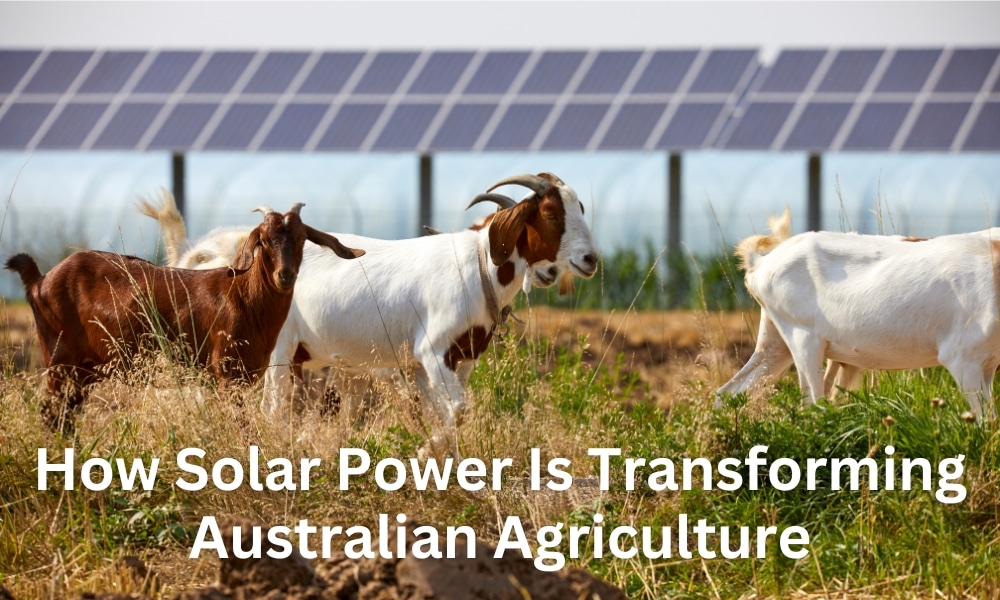Australia’s agricultural sector is embracing a renewable revolution, with solar power leading the way. Solar energy is becoming an indispensable tool for modern farming, reducing operational costs and ensuring sustainability. Let’s delve into the benefits and applications of renewable energy in agriculture and how solar farming is revolutionising the industry.
If you want to future-proof your farm, Energy Matters can help you switch to solar.
Discover how renewable energy reshapes agriculture and creates a brighter, greener future. As a trusted leader in solar solutions, Energy Matters is here to guide Australian farmers through this vital transition. Energy Matters helps Australian home and business owners receive personalised solar quotes through our large network of high-quality solar installers. With our 3 free solar quotes, you can compare plans from pre-qualified and vetted installers in your area and find the perfect solution for your home and business.
The rising role of solar in Agriculture
Solar power has become increasingly important in agriculture, providing a reliable and eco-friendly alternative to traditional energy sources. Farmers across Australia are turning to solar solutions to power irrigation systems, greenhouses, and processing equipment. Agricultural solar applications range from irrigation to refrigeration, offering farmers greater independence from fossil fuels. By investing in renewable energy in agriculture, Australian farmers can cut electricity costs and increase sustainability.
Why solar power?
- Cost savings: The soaring prices of conventional electricity have made solar energy a cost-effective choice for farmers.
- Sustainability: Solar farming aligns with global sustainability goals by reducing greenhouse gas emissions.
- Energy independence: With solar, farms can operate off-grid, ensuring uninterrupted power even in remote areas.
Applications of solar power in agriculture
The versatility of solar power makes it suitable for various agricultural solar applications in Australia:

1. Solar-powered irrigation systems
Irrigation is a critical yet energy-intensive aspect of farming. Solar-powered pumps enable farmers to efficiently draw water from wells, dams, or rivers without relying on expensive diesel generators.
2. On-farm solar processing
Solar energy is used to power machinery for processing crops, such as drying, milling, and packaging. This reduces operational costs and enhances productivity.
3. Livestock management
Solar panels are also employed to run dairy farms’ electric fences, livestock water pumps, and cooling systems.
4. Greenhouse operations
- Solar panels provide heating, ventilation, and lighting for greenhouses, reducing operational costs.
- Efficient climate control ensures optimal conditions for plant growth year-round.
5. Cold storage and refrigeration
- Solar energy keeps perishable produce fresh, reducing waste and improving storage efficiency.
- Solar-powered refrigeration units are especially beneficial for dairy and fruit farms.
6. Electric fencing and farm security
- Solar-powered electric fences offer a cost-effective way to secure farmland and livestock.
- Energy storage systems ensure 24/7 protection, even during cloudy days
The future of solar in agriculture
The future of solar in agriculture is promising, with technological advancements paving the way for innovative solutions. Emerging trends include:
- Solar-powered drones: Used for crop monitoring and pest control, these drones are revolutionising precision farming.
- Automated smart farms: Solar energy drives automation, enabling farms to operate with minimal human intervention.
- Solar battery energy storage solutions: Combining solar battery energy storage systems ensures consistent power supply even during cloudy days or at night.
Embrace the energy efficiency revolution by upgrading your solar systems and adding a battery, solar inverters + more with Energy Matters.
Solar farming in Australia: A game changer
Solar farming in Australia involves using solar photovoltaic (PV) systems to meet agricultural energy needs. This can include solar panels installed on rooftops, ground-mounted systems, or even floating solar installations on dams and water reservoirs. By integrating solar, farms can achieve significant energy independence while contributing to Australia’s renewable energy goals.
Key benefits of solar farming: Agricultural solar applications in Australia
1. Cost savings on energy bills
- Solar-powered farms significantly reduce electricity expenses by generating free energy from the sun.
- With high electricity rates in rural Australia, solar installations offer long-term savings and financial stability.
- Feed-in tariffs allow farmers to sell excess power to the grid, creating an additional revenue stream.
2. Sustainability and environmental impact
- Using solar energy reduces reliance on fossil fuels, decreasing greenhouse gas emissions.
- Sustainable farming practices contribute to reducing agriculture’s carbon footprint.
- Solar farming supports Australia’s renewable energy goals, promoting a cleaner and greener future.
3. Energy independence and reliability
- Remote farms often face power supply issues, making agricultural solar applications a reliable alternative.
- Off-grid solar systems with battery storage ensure uninterrupted power for essential farm operations.
- Solar-powered farms are less vulnerable to energy price fluctuations, providing long-term economic security.
Solar farming in Australia: Innovative approaches
- Agrivoltaics:
- This innovative approach combines agriculture and solar energy by integrating solar panels into farming systems.
- For example, solar panels can be installed above crops, providing shade and reducing water evaporation while generating electricity.
- Solar grazing:
- This practice involves utilising the land beneath solar panels for livestock grazing, providing a dual-use land management strategy.
- Solar grazing can enhance biodiversity and improve soil health while generating renewable energy.
Challenges and considerations
- Initial investment costs:
- While the long-term benefits of solar power are significant, the initial investment costs can be a barrier for some farmers.
- Technical solar expertise:
- Installing and maintaining solar systems requires technical expertise.
- Farmers may need to invest in training or seek professional assistance.
- Grid integration:
- Connecting solar systems to the grid can involve complex procedures and regulations.
- Land availability:
- Installing large-scale solar farms requires a significant land area, which may not be available for all farmers.
Government support and incentives
The Australian government has generous rebates and incentives to encourage the adoption of solar power in agriculture, including:
- Renewable Energy Certificates (RECs):
- Renewable Energy Certificates provide financial incentives for generating renewable energy.
- Feed-in tariffs:
- Feed-in tariff programs allow farmers to sell excess electricity from their solar systems back to the grid.
- Grants and subsidies:
- Various government programs offer grants and subsidies to support the installation of solar systems on farms.
The future of solar power in Australian agriculture
Solar power is not just transforming Australian agriculture; it is shaping the future of farming. Farmers can reduce costs, increase productivity, and contribute to environmental sustainability by embracing solar energy. Solar farming is the way forward for Australia’s agricultural sector, whether powering irrigation systems or promoting energy independence.
At Energy Matters, we are committed to helping you harness the full potential of solar energy. Energy Matters is one of Australia’s most trusted solar quotes due to our high customer satisfaction and industry recommendations. Our team of solar experts can help you get up to 3 FREE solar quotes from pre-qualified and vetted solar firms in your area. Let’s harness the power of the sun together!
















































